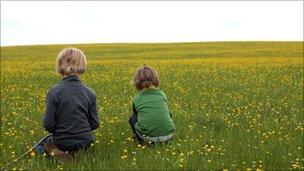Flu vaccine policy for children defended
- Published

The swine flu virus is targeting the young, and not the elderly, experts say
Children under five were not included in this year's flu vaccination programme because of medical and not cost grounds, the government says.
Health Secretary Andrew Lansley accepted independent advice not to repeat last year's jabs for children, the Department of Health said.
It said its policy was based on age and risk factors and was always under review.
Labour has criticised a lack of protection for young children.
The independent Joint Committee on Vaccination and Immunisation (JCVI) issues seasonal vaccine advice and recommended that healthy children under five were not at risk, officials said.
For its advice during 2009's swine flu outbreak, it had recommended healthy under-5s be vaccinated.
In a statement, committee chairman Professor Andrew Hall said: "The JCVI has never recommended that children under five who are not in an at-risk group be vaccinated as part of the seasonal flu programme.
"All children under five were routinely vaccinated during the pandemic flu vaccination programme, but in line with previous years and the current evidence, the JCVI did not recommend healthy children under five were vaccinated against flu during the current season."
Responding to media reports that the decision was a cost-cutting measure to save £85m, the Department of Health said: "Our influenza immunisation programme has been designed to protect those particularly at risk from serious disease, either from influenza itself or in whom influenza would make their underlying disease worse."
'Unusual situation'
Figures published by the Health Protection Agency on 24 December showed the number of people in critical care with confirmed or suspected flu in England had risen to 460 - more than double the number of a week before.
Of those, 366 were aged between 16 and 64, 51 were aged 65 and over, 26 were under five and another 17 were aged between five and 15.
Of the 27 people to have died from flu this season so far, nine were children. Among the fatalities, 24 had swine flu. Three suffered from another strain, flu type B.
This year's vaccine protects against H1N1, the same strain of flu behind last year's swine flu pandemic, and also protects against the H3N2 and B strain.
Professor John Oxford, a virologist at Barts and the Royal London, said the current statistics for flu cases were "unsettling", and could worsen over the next week.
"The thing about this swine flu is that it doesn't go for elderly people, it doesn't go for anyone over the age of 60. It's going for youth and that's a rather unusual situation that we're all grasping with," he said.
"The vaccine campaigns in the past have concentrated on the over-65s. From now on they're going to have to concentrate as well on youth, and young people are the most difficult to persuade either that they've got something or to go into their doctor and get something."
'Political opportunism'
Mr Lansley said people should not be concerned about the vaccine.
"The seasonal flu vaccine is decided internationally by the World Health Organization, we can see now that this swine flu, plus influenza B plus another flu strain is circulating. The flu vaccine is an effective vaccination against that," he said.
He defended the decision to axe the national publicity campaign to save cash, and urged those in vulnerable groups to take up invitations to have the jab.
"There is no additional merit in a vaccination advertising campaign for the general population when there is already a targeted approach for those who need to be called," he said.
"People who are at risk, and indeed pregnant women and over-65s, should be taking up the offer of vaccination, they have been contacted by their GP surgeries."
Shadow health secretary John Healey accused ministers of leaving children at risk.
"We knew this would not be like normal winter flu, because we dealt with it last year as part of the world swine flu pandemic," he said.
"We knew it can put people seriously ill in hospital, and we knew it hits young children and others who are not normally badly ill with flu."
But health minister Simon Burns accused Labour of stooping to a "new low of political opportunism".
"By calling on the government to reject independent scientific advice, they risk undermining the public confidence in immunisation programmes which is so crucial to their success," he said.
"John Healey is either spectacularly ill-informed or playing politics with people's health. He should either apologise or be ashamed."
- Published28 December 2010
- Published24 December 2010
- Published22 December 2010
- Published21 December 2010